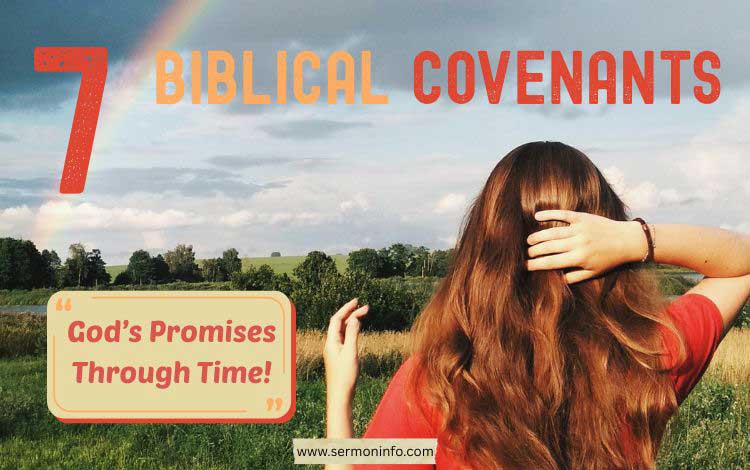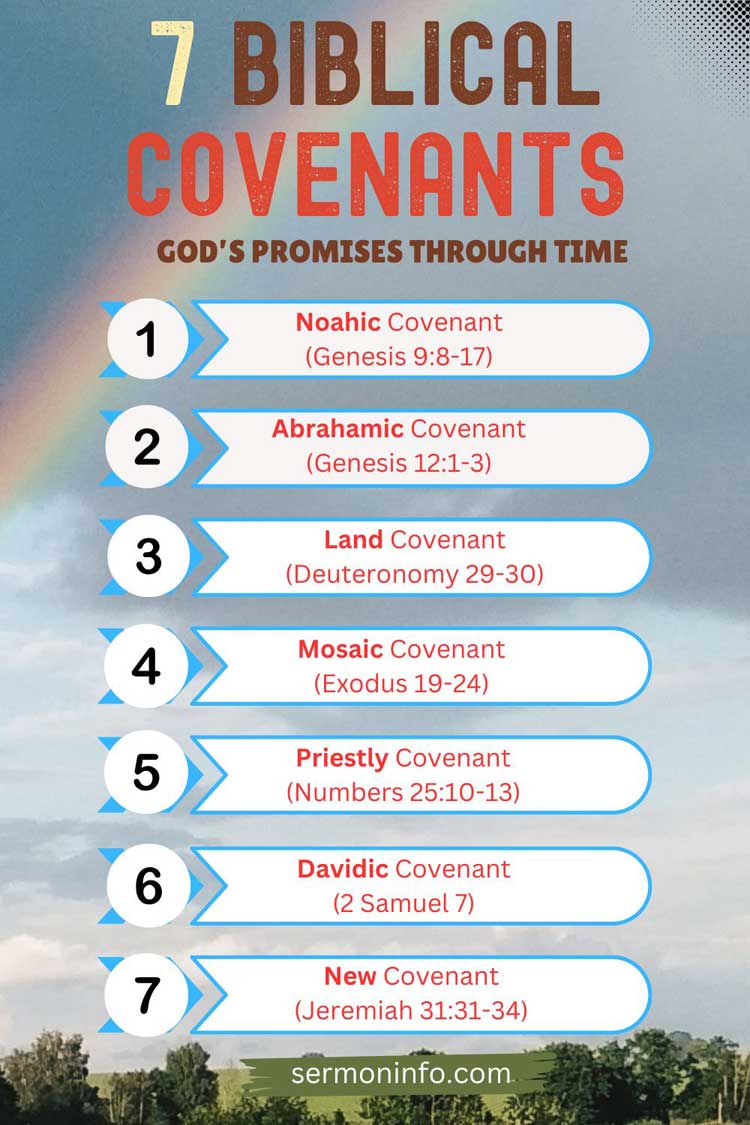Understanding the 7 Biblical Covenants is like tracing God’s fingerprints through history—and discovering He’s still working in your story today.

Understanding the 7 Biblical Covenants
When we look at the big picture of the Bible, we see a faithful God who makes and keeps promises. These promises—called covenants—form the backbone of the story of redemption from Genesis to Revelation.
God didn’t just set the world in motion and step away. He stepped into history, made binding agreements with people, and revealed His heart along the way. Some of these covenants were unconditional, based solely on God’s faithfulness, while others were conditional, depending on human obedience.
Let’s walk through the seven major covenants in Scripture and see what each one tells us about who God is—and who we are in Him.
1. Noahic Covenant (Genesis 9)
The Noahic Covenant is the first major covenant we see after the flood. In Genesis 9, God promises Noah—and all creation—that He will never again destroy the earth with a flood. This was an unconditional covenant, not based on anything Noah or anyone else would do in the future.
God sealed this promise with a rainbow, which still reminds us of His mercy every time a storm clears. Even in judgment, God moves toward mercy.
2. Abrahamic Covenant (Genesis 12, 15, & 17)
Next comes the Abrahamic Covenant, which really sets the stage for everything else in the Bible. In Genesis 12, 15, and 17, God calls Abraham and makes a bold, threefold promise: land, descendants, and blessing to all nations through him. This covenant is also unconditional—God confirmed it with a solemn ceremony, walking alone through the pieces to show that the responsibility rested on Him alone.
The sign of circumcision marked this covenant for Abraham’s descendants. And ultimately, the blessing to all nations comes through Jesus Christ, the promised Seed of Abraham.
3. Land Covenant (Deuteronomy 29-30)
Building on that is what’s often called the Land Covenant, or the Palestinian Covenant, found in Deuteronomy 29–30. This covenant reaffirms God’s promise to give Israel the land, but adds a warning: they would be disciplined and even scattered if they disobeyed. However, God also promises to restore them when they repent.
So this covenant has both conditional and unconditional elements—Israel’s ability to live in the land depended on obedience, but their eventual possession of it was guaranteed by God.

4. Mosaic Covenant (Exodus 19-24)
The Mosaic Covenant comes next, given at Mount Sinai in Exodus 19–24. This was a conditional covenant between God and the nation of Israel. God gave them the Law, including the Ten Commandments, and laid out clear terms: if they obeyed, they’d be blessed; if they disobeyed, they’d face consequences.
This covenant showed God’s holiness and what it meant to live as His chosen people. But it also highlighted humanity’s inability to keep the law, pointing forward to the need for a better covenant.
5. Priestly Covenant (Numbers 25:10-13)
In the middle of a dark time in Israel’s history, we see the Priestly Covenant in Numbers 25:10–13. After Phinehas zealously defended God’s honor during a time of national sin, God made a covenant with him and his descendants, promising a lasting priesthood.
This was initially conditional—based on Phinehas’ faithfulness—but the result was an unconditional promise of ongoing blessing for his lineage. It’s a reminder that God honors those who lead with righteousness and courage.
6. Davidic Covenant (2 Samuel 7)
Later, God makes a powerful promise to King David in the Davidic Covenant, found in 2 Samuel 7 and echoed in Psalm 89. God tells David that his house, his kingdom, and his throne will be established forever.
This is a deeply unconditional covenant—even when David’s descendants fell into sin, God never revoked the promise. This covenant points directly to Jesus, the Son of David, who now reigns eternally as King.
7. New Covenant (Jeremiah 31:31-34)
Finally, we come to the New Covenant, prophesied in Jeremiah 31:31–34 and fulfilled in Luke 22:20 through Jesus’ death and resurrection. This covenant brings forgiveness of sins, transformed hearts, and the indwelling of the Holy Spirit.
It’s the covenant we live under today, and it is gloriously unconditional. We don’t earn it—we receive it by grace through faith in Christ. Jesus sealed this covenant with His own blood, and every time we take communion, we remember that this promise still stands.
Summary
In summary, God’s covenants are more than historical footnotes. They reveal His nature, His consistency, and His desire to dwell in relationship with His people. Some were conditional, showing us our need for grace. Others were unconditional, showing us the depth of His mercy. But all of them lead us to Jesus—the ultimate fulfillment of every promise God has ever made.
Source Material
Biblical Doctrine by John MacArthur and Richard Mayhue
Systematic Theology by Wayne Grudem
Christian Theology by Millard J. Erickson
The Moody Handbook of Theology by Paul Enns